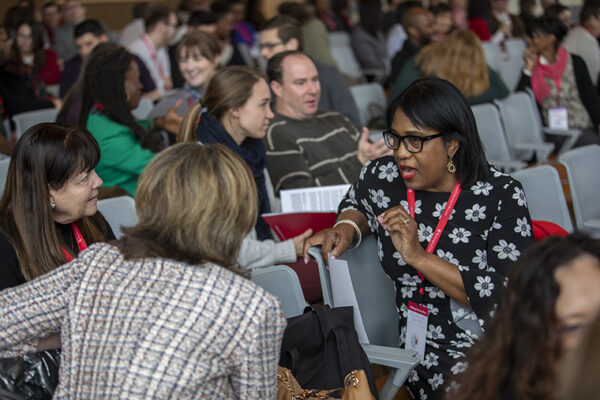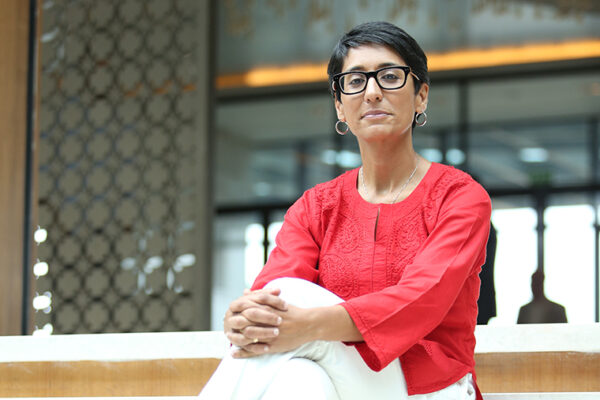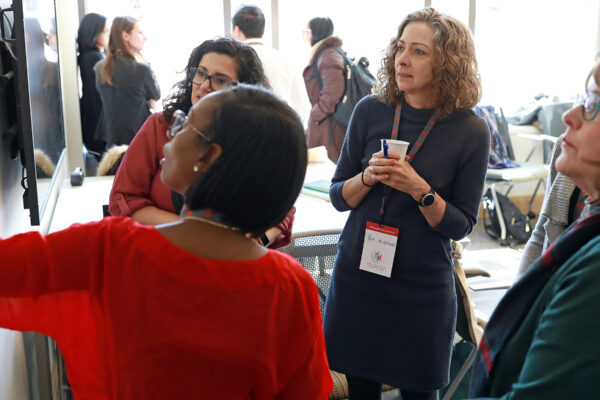Somewhere along the way, we not only forgot how to talk to those who are on opposite sides of our political and societal views, but we also became afraid to approach each other with difficult conversations. Or we engage in debates via social media or other public forums that only serve to deepen the divide and avoid the one-on-one connections that can bridge gaps.
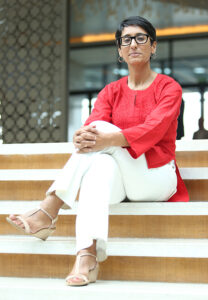
It’s that fear of connection that Irshad Manji, bestselling author, award-winning filmmaker and acclaimed religious reformer, embraces head-on through her mission to teach the skill of moral courage — and her timing could not be better. Moral courage, she says, is a path to strengthening diversity and generating new ideas and innovations.
It’s just one of the topics Manji will address as keynote speaker for Washington University in St. Louis’ fifth annual Day of Discovery, Dialogue & Action event, scheduled for Tuesday and Wednesday, Feb. 19 and 20. Manji’s talk, “Moving Beyond Labels: A Conversation About Diversity, Bigotry & Common Humanity,” begins at 5 p.m. Feb. 19 at the Eric P. Newman Education Center on the Medical Campus.
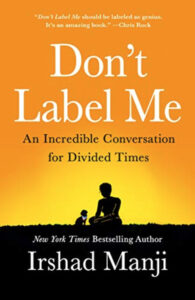 A panel discussion will wrap-up her presentation and a reception will follow, where Manji will sign her upcoming book, “Don’t Label Me: An Incredible Conversation for Divided Times,” set for release Feb. 26. The first 250 participants will receive complimentary copies.
A panel discussion will wrap-up her presentation and a reception will follow, where Manji will sign her upcoming book, “Don’t Label Me: An Incredible Conversation for Divided Times,” set for release Feb. 26. The first 250 participants will receive complimentary copies.
Space is limited, so those wishing to attend are strongly encouraged to register for this and other events on the Day of Discovery website. With this year’s theme of “Dialogues Across Difference,” Manji’s address will offer both a challenge and a tool box of skills needed to get the most out of the two-day event — and implement those newly learned skills afterward.
Here, she goes deeper into a few of the ideas she will share during her visit:
You define moral courage as doing the right thing in the face of fear. Why are we so afraid in 2019? Are you optimistic this will change?
We human beings “think” first and foremost emotionally and, biologically speaking, fear is the easiest emotion to have. Now add the fact that we’re immersed in technology deliberately designed to amp up our emotions. Then top it all off with the reality that we’re rarely taught to be aware of our emotions, never mind how to express them constructively. In such a whirlwind environment, labels such as “racist” or “libtard” come in handy. They’re convenient tools for indulging in our emotions and avoiding self-reflection. I realize that I sound pessimistic, but I’m actually hopeful that humans can learn to balance our impulses with introspection. If I wasn’t hopeful, I couldn’t devote my life to teaching moral courage.
The world is a much different place for this current generation of college students than it was for their parents and college administrators. Technology has made it a smaller place and given us shorter attention spans. What can we do to bridge that gap?
Ask questions. Lots of them. Especially of those who disagree with you on whatever you’re passionate about. And — here’s the key — ask with the intention to understand rather than to “win.” Among the ironclad rules of human psychology is this: You’re more likely to be heard when you give others a fair hearing. Yes, this takes time. But what do you care more about: social change or personal convenience? Be honest!
Let’s talk about labels, which are just words and “slices of who we are,” as you have said. But these are words that have generations of cultural and societal “norms” ingrained into them. How can we begin to change the meaning of these words?
By learning to become effective communicators and relationship-builders. For example, I’m a faithful Muslim who advocates for an Islam that embraces liberty and love. I’ve been called every label in the book — from “stealth jihadist” to “Uncle Tom.” Now, I could choose to pigeonhole my critics as they’ve done to me, but how does payback amount to progress? Better to ask the skeptics where they’re coming from. By learning what they value, you’ll be able to reframe your arguments in ways that they can hear. To change norms, first lower the emotional defenses that protect those norms.
Sometimes it seems as if we label ourselves sometimes more harshly than anyone else. Shouldn’t we start there?
For sure. When you slap labels on yourself — “Muslim” or “queer” or “black” or “feminist” or “capitalist” or “conservative” — it’s easy to assume that your identity is also your integrity, your whole being. But that’s just not true. Every one of us is more than meets the eye. In our individuality, we’re all plurals — excuse the label! “We the polarized” can evolve into “we the plurals” as long as we take disagreement as an invitation to engagement.
You have talked about the notion of dishonest diversity vs. honest diversity. Will you talk a bit more about what you mean?
Diversity is dishonest if it slices and dices individuals into categories and leaves them there. Labels can be starting points for further discovery but they should never be finish lines because, after all, labels can lie. They flatten each of us to one dimension, vaporizing all the rest that makes us plurals. By contrast, honest diversity moves beyond labels. It includes different viewpoints and not merely different complexions, genders and religions. Honest diversity liberates us from our “assigned places,” since we need never be defined by prefab categories and the baggage that goes with them. It’s a nation-building approach that reconciles social justice and free expression, diversity and liberty. I can’t wait to interact with the WashU community about it.
